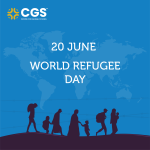
The World Refugee Day, established by the United Nations on June 20th, is a powerful reminder of the global commitment to honor and support refugees facing numerous daily challenges.
The 1951 Refugee Convention and its 1967 Protocol represent the principal normative frame of the United Nations concerning the rights of refugees and cover many aspects of their lives. According to the 1951 Convention, refugees have rights regarding the possibility of carrying out a decent life – for instance, having a right to work, housing, and education – and being respected and well-integrated within the host countries. This set of fundamental and inalienable rights aims at protecting individuals who are often forcibly displaced from their homes and compelled to flee from their countries of origin due to situations of war, persecution, and terror. However, there is still much that must be done to ensure the thorough protection and integration of refugees all over the World.
PAM and CGS actively foster the legal and socio-economic framework underpinning the question of refugees and the overall migratory phenomenon. The Mediterranean area is an entangled crossroad of migration trajectories where many individuals put their lives at stake, hoping to improve their conditions and seek a better future. The International Organization for Migration calculated that, in the last ten years, more than 28.000 migrants died in the Mediterranean Sea. This vast number clearly shows the extent to which the international community is falling short of cooperating to assist refugees and migrants generally.
PAM and CGS are critical players in setting up a tight collaboration within the United Nations system to provide knowledge and data that will enhance the institutional decision-maker’s capabilities to bring about effective policies and eliminate the barriers and constraints that hinder the existence of thousands of displaced persons. PAM and CGS are not solely focusing on the migratory routes and the countries of arrival but also delve into the causes of this complex and multifaceted phenomenon. Exploring the economic, social, and security-related reasons that lead people to leave their homes will be at the core of the CGS commitment towards a more inclusive and safer future.

